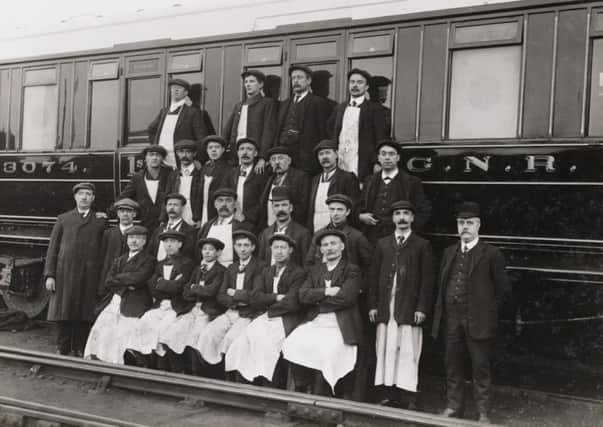Army reservist’s tribute to 20,000 fallen railwaymen


ARMY reservist Major Jeremy Higgins has spent seven years working on a book which is a personal tribute to railway workers who died in the Great War.
A railway industry worker himself, his interest in the 1914-18 conflict was prompted when he noticed a war memorial to railway workers in Leamington Spa after he returned from a six-month tour of duty in Iraq.
Advertisement
Hide AdAdvertisement
Hide Ad“I was probably still shell shocked from my time away and thought ‘who are these people and what was their story?
“If I had been killed in Iraq, would I have become just a name on a memorial?”
Thinking about his own service made him determined to find out more about the 1914 generation.
His book, Great War Railwaymen, which focuses on 1,000 railwaymen killed in the conflict, is due to be published shortly.
Advertisement
Hide AdAdvertisement
Hide Ad“My aim with the book is to try to remember these people who served and died and bring out what happened to a modern audience. I also wanted to raise money for the Army Benevolent Fund, The Soldiers’ Charity and the Railway Benefit Fund.
“It has taken me seven years to research 12,500 of the 20,000-plus railwaymen who died in the Great War. The story is fascinating and hopefully will be of interest to all.”
So far, through corporate sponsorship, he has raised more than £36,000 for good causes.
“The response has been outstanding, even before I have sold a single copy.”
Advertisement
Hide AdAdvertisement
Hide AdAmong the stories in the book is that of brothers Gerald and Reginald Wilkinson, who both worked as a clerks for the North Eastern Railway.
Both served in the 15th Battalion, West Yorkshire Regiment - also known as the Leeds Pals.
“Both died on July 1 1916, the first day of the battle of the Somme – 250 of the Battalion died that day. At least 242 railwaymen from across the country died that day.”
Mr Higgins, who is customer service director with CrossCountry Trains, came across story after story of heroism and sacrifice among railway workers.
Advertisement
Hide AdAdvertisement
Hide AdOne which stood out is that of Sergeant HB Parkin, a York-based clerk with the North Eastern Railway who also served with the West Yorkshire Regiment.
Parkin was awarded a posthumous Distinguished Conduct Medal for fighting off a German attack on his own.
His citation reads: “For conspicuous gallantry and devotion to duty, during a very heavy bombardment of the line followed by a raid of storm troops, though wounded during bombardment, he refused to leave his post and though all his men were eventually killed or wounded, he succeeded in holding out single handed and in killing an officer and two men who penetrated the post.
“He was again severely wounded and, on arrival of reinforcements, was found propped against the trench in a pool of blood.
Advertisement
Hide AdAdvertisement
Hide Ad“But for his courage the enemy would have succeeded in a lodgment in our line.”
Mr Higgins, who is based in Birmingham, says it should not be forgotten that railwaymen also served at sea and in the air.
He is now keen to hear from anyone who has further information about individual railway workers who served in the Great War.
“So far I have researched 12,500 railway workers who died but I am keen to find out more about those that came back.”
Advertisement
Hide AdAdvertisement
Hide Ad“Over 180,000 railwaymen served in the First World War. I don’t believe any other organisation contributed more. Of those, 20,000 died.”
• For more information about the book email: [email protected]